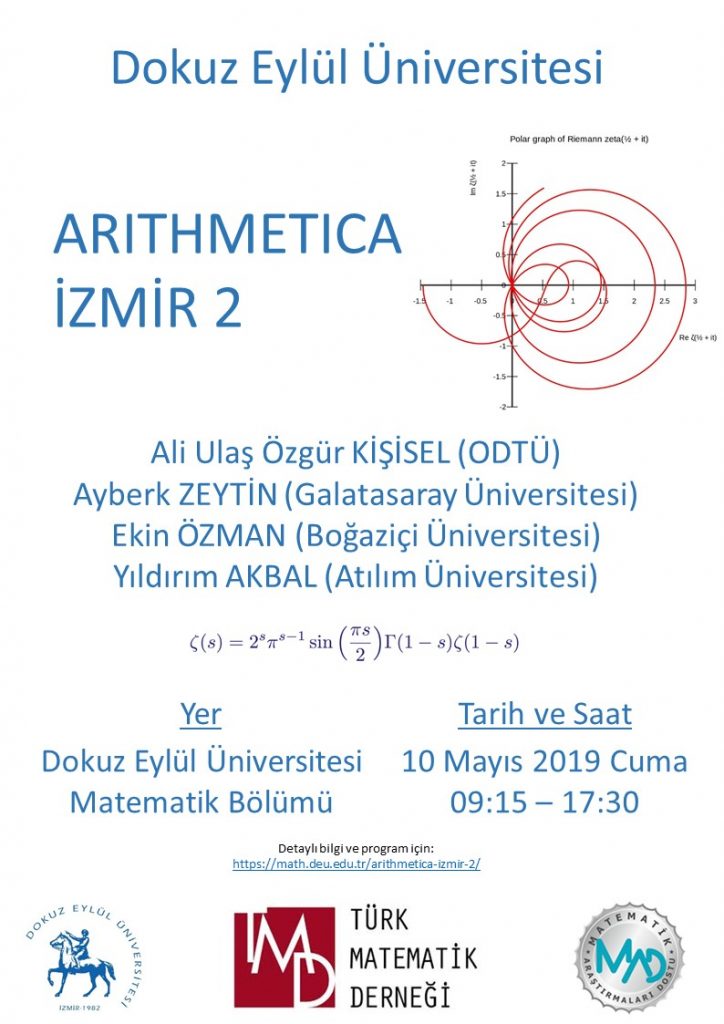10 Mayıs 2019 Cuma düzenlenecek olan Arithmetica İzmir 2 Çalıştayı için son başvuru tarihi 2 Mayıs 2019’dur. Çalıştayımız MAD projesi kapsamında Türk Matematik Derneği tarafından desteklenmektedir. Türk Matematik Derneği’ne (TMD) ve MAD projesine destekleri için çok teşekkür ediyoruz.
Yer: Dokuz Eylül Üniversitesi, Matematik Bölümü, B256
Tarih: 10 Mayıs 2019
Başvuru formu için tıklayınız
Davetli Konuşmacılar
Ali Ulaş Özgür Kişisel, Orta Doğu Teknik Üniversitesi
Ayberk Zeytin, Galatasaray Üniversitesi
Ekin Özman, Boğaziçi Üniversitesi
Yıldırım Akbal, Atılım Üniversitesi
Program ve Özetler
9:15—9:30: Açılış
9:30—10:45: Ali Ulaş Özgür Kişisel
10:45—11:15: Çay-Kahve molası
11:15—12:30: Ekin Özman
12:30—14:30: Öğle arası
14:30—15:45: Yıldırım Akbal
15:45—16:15: Çay-Kahve molası
16:15—17:30: Ayberk Zeytin
Ali Ulaş Özgür Kişisel, Orta Doğu Teknik Üniversitesi
Title: Line Arrangements Over Different Base Fields
Abstract: There are various obstructions regarding the existence of line arrangements in the projective plane over a given base field. In this talk, some of these obstructions and how they depend on the chosen base field will be explained.
Ekin Özman, Boğaziçi Üniversitesi
Title: Modularity, rational points and Diophantine Equations
Abstract: Understanding solutions of Diophantine equations over rationals or more generally over any number field is one of the main problems of number theory. One of the most spectacular recent achievement in this area is the proof of Fermat’s last theorem by Wiles. By the help of the modular techniques used in this proof and its generalizations it is possible to solve other Diophantine equations too. Understanding quadratic points on the classical modular curve or rational points on its twists play a central role in this approach. In this talk, I will summarize the modular method and mention some recent results about points on modular curves. This is joint work with Samir Siksek.
Yıldırım Akbal, Atılım Üniversitesi
Title: Waring’s Problem, Exponential Sums and Vinogradov’s Mean Value Theorem
Abstract: Having introduced Hardy&Littlewood Circle method, we will jump to Waring’s Problem: representability of a large integer as the sum of s kth powers of positive integers, which was the main motivation of Vinogradov to study a system equations (called Vinogradov’s system). Next we move on Vinogradov’s mean value theorem: a non-trivial upper-bound on the number of solutions to Vinogradov’s system, and then mention the milestone contributions of Vinogradov, Wooley and Bourgain (rip) et al.
Last but not least, some applications of Vinogradov’s mean value theorem on exponential sums will be given.
Ayberk Zeytin, Galatasaray Üniversitesi
Title: Arithmetic of Subgroups of PSL2(Z)
Abstract: The purpose of the talk is to introduce certain arithmetic questions from a combinatorial viewpoint. The fundamental object is the category of subgroups of the modular group and its generalizations. I will try to present the different nature of arithmetic of subgroups of finite and infinite index and their relationship to classical problems. I plan to formulate specific questions at the very end of the presentation and, if time permits, our contribution to both worlds.
This is partly joint with M. Uludag


